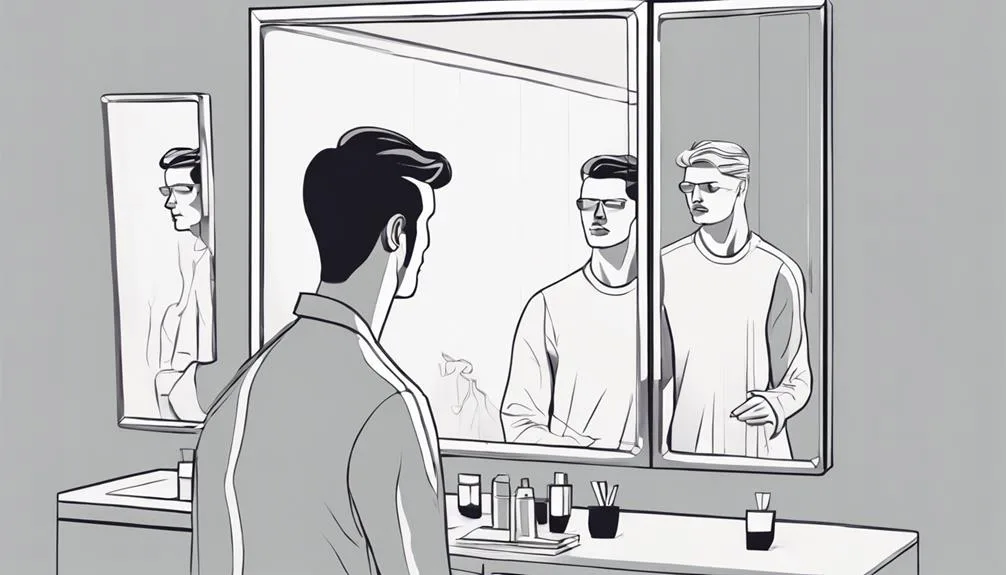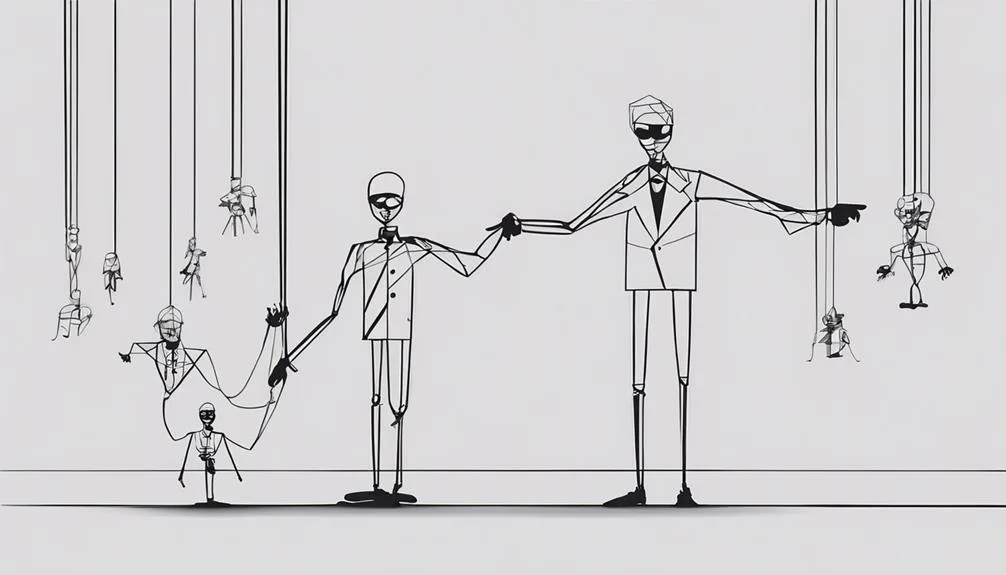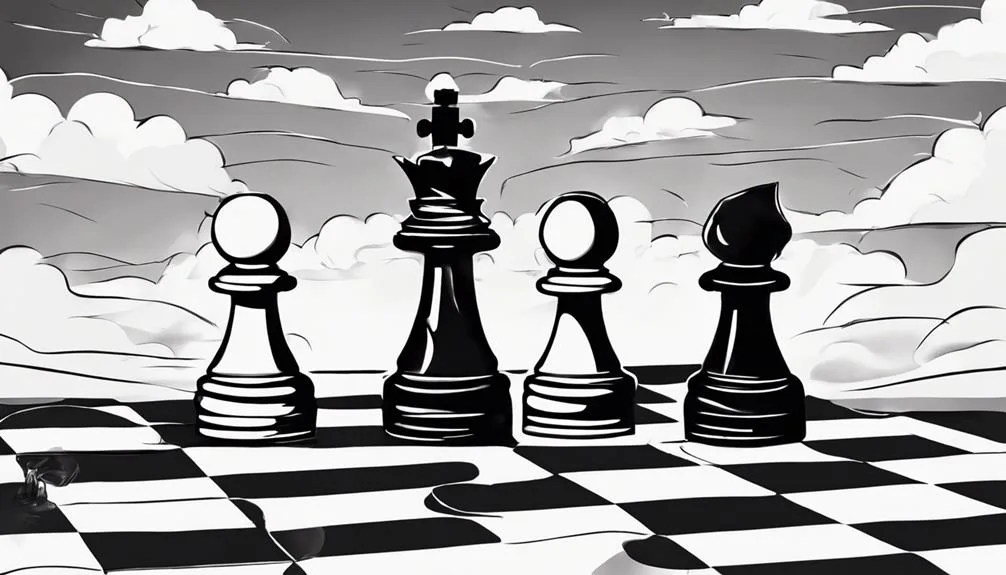Understanding relationships means spotting the bad traits that can hurt them. You might know these seven toxic types, from the self-centered to the overly critical. Knowing who to steer clear of helps build good relationships.
But what if you can't avoid them? This guide will show you how to deal with difficult people while keeping your peace, even when you have to stay connected.
Key Takeaways
- Avoid narcissists who lack empathy and are incapable of genuine love.
- Steer clear of constant critics who undermine your self-esteem.
- Distance yourself from manipulators using guilt and gaslighting tactics.
- Protect your peace from Negative Nellies who drain emotional energy.
The Narcissist

Recognizing a narcissist in a relationship can save you from being caught up in their self-centered world. You'll notice their constant hunger for narcissistic supply—compliments, admiration, and their need to always be the center of attention.
It's like they're on a never-ending quest to fill an emotional void, but no amount of your effort or love will ever be enough. Their empathy deficit becomes glaringly apparent when you're going through tough times. Instead of support, you're met with indifference or even annoyance because your needs might momentarily overshadow theirs.
Being aware of these traits can help you steer clear of the emotional turmoil that inevitably comes with loving someone who's incapable of genuinely loving you back.
The Constant Critic

You'll often find yourself walking on eggshells around the Constant Critic, a type of toxic individual who seems to find fault in almost everything you do. This relentless criticism can greatly impact your self-esteem, making you doubt your worth and abilities.
To navigate this dynamic, it's important to develop improvement strategies that bolster your confidence. Start by setting clear boundaries about what's and isn't acceptable feedback. Communicate openly about how their behavior affects you, focusing on your feelings rather than their intentions.
Cultivate a strong support system outside of this relationship to remind you of your strengths and achievements. Finally, engage in activities that reinforce your self-worth and remind you that you're more than the criticisms you receive.
The Manipulator

Manipulators, often disguised as caring individuals, expertly twist situations to their advantage, leaving you feeling confused and at fault. They're masters of gaslighting tactics and emotional blackmail, making it important to recognize them early on.
| Signs | Impact on You |
|---|---|
| Frequent use of guilt trips | Drains your emotional energy |
| Gaslighting tactics | Erodes your sense of reality |
| Insistence you're always wrong | Lowers your self-esteem |
| Emotional blackmail | Traps you in guilt |
| Shifting blame | Leaves you always apologizing |
These manipulative behaviors are designed to control and dominate. Spotting them early can save you from a cycle of manipulation, preserving your well-being and ensuring healthier relationships in the future.
The Jealous Type

Jealous individuals often cloak their insecurities with excessive possessiveness, impacting your freedom and self-expression. The root causes of their jealousy are varied, ranging from low self-esteem to previous relationship traumas. These insecurities drive them to control and monitor your interactions, fearing they might lose you to someone else. Understanding these triggers is important in dealing with jealous partners.
Coping strategies involve clear communication and setting boundaries. You'll need to reassure them of your commitment while also asserting your need for personal space. Encourage them to work on their self-confidence and perhaps seek professional help if their behavior escalates. Remember, you can't fix their jealousy, but you can support them in overcoming it, ensuring a healthier relationship for both of you.
The Victim Player

Another toxic archetype to be wary of in relationships is the victim player, who often uses guilt and sympathy to control or influence your actions. They're masters at self-responsibility avoidance, skillfully dodging accountability for their actions and instead, painting themselves as perpetual victims of circumstances or others' actions.
| Trait | Impact on Relationship |
|---|---|
| Self Responsibility Avoidance | Erodes trust and fosters resentment. |
| Perpetual Complaint | Drains energy and diminishes joy. |
| Guilt Manipulation | Creates unhealthy dynamics and power imbalances. |
Recognizing these behaviors early can help you avoid getting entangled in a web of manipulation, ensuring a healthier, more balanced relationship. Remember, it's important to maintain a boundary against those who consistently refuse to take accountability for their actions.
The Control Freak

Control freaks often seek to dictate every aspect of your life, from what you wear to who you spend time with. They may appear caring at first, but their behavior soon stifles your independence.
Boundary setting becomes essential when dealing with a control freak. It's about making clear what's acceptable and what's not, ensuring your autonomy is respected. However, this is often met with resistance, leading to a communication breakdown. They might dismiss your feelings, insisting they know what's best, which undermines your confidence and decision-making abilities.
If conversations about boundaries and respect lead nowhere, it's a sign that the relationship is detrimental to your well-being. Remember, a healthy partnership thrives on mutual respect and freedom, not control.
The Negative Nelly

Negativity, like a dense mist, can engulf your relationship when dealing with a Negative Nelly. They're a master at making pessimism spread, turning every situation into an energy drain. Here's how they might affect you:
- Constant Grumbles: Every conversation turns into a list of what's wrong with the world, leaving no room for positivity.
- Dulled Enthusiasm: Your excitement for new ideas or plans quickly diminishes in their presence, as they highlight why things won't work.
- Focus Shift: You start seeing the glass as half empty, influenced by their negative outlook.
- Emotional Drain: Trying to uplift them becomes a relentless task, draining your energy and affecting your well-being.
Staying aware of these signs helps you protect your peace and maintain a healthier relationship dynamic.
Conclusion
To maintain your mental well-being and cultivate nurturing relationships, it's essential to keep a distance from toxic personalities. Avoiding narcissists, critics, manipulators, the enviously inclined, victim players, control freaks, and those who perpetually dwell in negativity is crucial.
The relationships you choose should uplift and support you, rather than deplete your energy and self-esteem. Selecting the right company is paramount for fostering a positive environment.
What kind of relationships will you choose to nurture and how will they shape your journey towards happiness and fulfillment?

